
Gustavo Adrián Cerati was an Argentine musician, singer-songwriter and record producer, who gained international recognition for being the leader, vocalist, composer and guitarist of the rock band Soda Stereo. He is widely considered by critics, specialized press, and musicians as one of the most important and influential artists of Latin rock. Billboard magazine ranked Cerati as the 33rd best rock singer of all time.
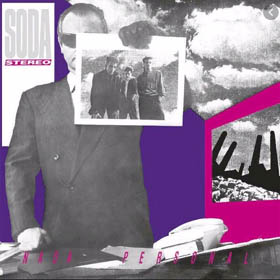
Nada Personal is the second album recorded by Argentine rock band Soda Stereo, released in 1985. It was recorded at Estudios Moebio in Buenos Aires, Argentina and remastered in 2007 at Sterling Sound Studios in New York.
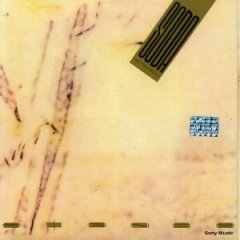
Signos is the third studio album recorded by Argentine rock band Soda Stereo, released on 10 November 1986. It was remastered in 2007 at Sterling Sound Studios in New York. In 2007, the Argentine edition of Rolling Stone ranked it 25 on its list of "The 100 Greatest Albums of National Rock".

Ruido Blanco is a live album recorded by the Argentine rock band Soda Stereo, released in 1987 and recorded on their "Signos" Latin American tour promoting the album of the same name. This album includes a unique track, "Vita-Set", consisting of two songs bonded by their initial chords. Frontman Gustavo Cerati started to hate the song after the tour and it was never played again.

Doble Vida is the fourth studio album by Argentine rock band Soda Stereo, released on September 15, 1988. Produced by Carlos Alomar, this was the second of only 2 Soda Stereo albums produced by someone outside the musical group, with the other being Soda Stereo, the eponymous debut album produced by Federico Moura of Virus.
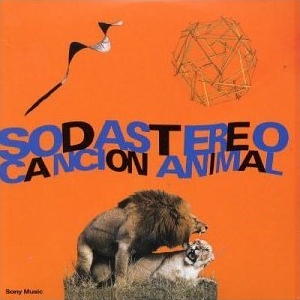
Canción Animal is the fifth album released by the Argentine rock band Soda Stereo, released in September 17, 1990. Many of the songs on the album are among the band's most popular, such as one of their biggest hits "De Música Ligera", the last song played in Soda Stereo's last concert in 1997, "Hombre al agua", "Un Millón de Años Luz", "Te para tres" and others. It is considered one of the best and most influential albums in the history of Latin American rock music. The anthemic status of the album, and specifically "De Música Ligera", is perhaps due to the band's ability to tap into a feeling experienced by almost every Spanish-speaking nation of going from dictatorship to freedom at some point during the 20th century. Many regard it as the best album to ever come out of South America. In 2007, the Argentine edition of Rolling Stone ranked it 9 on its list of "The 100 Greatest Albums of National Rock". The album sold 500,000 copies in Argentina alone.

Rex Mix is an EP remix recorded by Argentine rock band Soda Stereo. It was their second effort EP and was released by Sony Music in 1991. The EP contains remixes and new arrangements of previous songs, two songs recorded live at Gran Rex Theatre in Buenos Aires, and one new track: No necesito verte . Daniel Melero, then a frequent collaborator of the band, played an important role in this EP, doing remixes and bringing new concepts to the band.

Dynamo is the sixth studio album by Argentinian rock band Soda Stereo. It was first released in Argentina on 26 October 1992 by Sony Music Argentina.

Zona de Promesas: mixes 1984-1993 is an album recorded by Argentine rock band Soda Stereo. Their tenth album was released by Sony Music Entertainment in 1993. The album is composed of a series of remixes recorded by Soda Stereo that range between 1984 and 1993 and Zona de promesas, a track left in the cutting room of the band's previous album, Dynamo. This was the last album released through the Sony label.

Sueño Stereo is the seventh and final studio album recorded by Argentine rock band Soda Stereo. It was released by BMG Argentina in 1995. It is considered one of the most important alternative rock records in Spanish and one of the most successful and most important by the band and in all of Latin rock. Rolling Stone considered it the fourth-best in Latin rock history.

MTV Unplugged: Comfort y Música Para Volar is a part-live, part-studio album recorded by Argentine rock band Soda Stereo. The first seven tracks were recorded live at MTV Studios in Miami, Florida, for the show MTV Unplugged. The remaining four tracks were Sueño Stereo outtakes recorded in studio. The album was released by BMG Argentina in 1996. It was also the first Latin band to depart from the use of only acoustic instruments, using for most of the televised set conventional "plugged" instruments. Proof of this paradox is the fading "Un" part of the word unplugged depicted in the album cover.
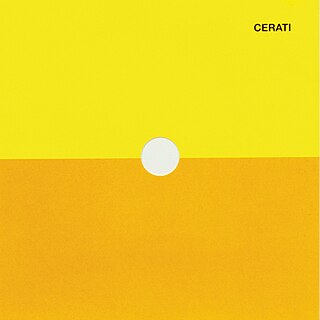
Amor Amarillo is the first solo album by Argentine rock musician Gustavo Cerati, as a side-project, while he was still active in Soda Stereo, his ex-band.
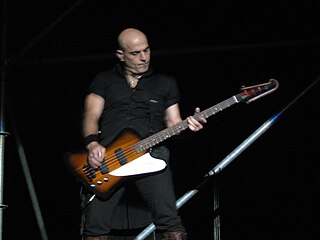
Héctor Juan Pedro Bosio better known by his stage name Zeta Bosio, is an Argentine rock musician, record producer and disc jockey (DJ), better known as the bassist of the Argentine rock band Soda Stereo. He was also the bassist of Chilean band La Ley between 2013 and 2014. Nowadays he plays in the band Shoot the Radio, which he co-founded.

Soda Stereo was an Argentine rock band formed in Buenos Aires in 1982. The band's membership consisted of singer-guitarist Gustavo Cerati, bassist Zeta Bosio and drummer Charly Alberti. During their career, the band released seven studio albums before disbanding in 1997.
Fabián Andrés González Amado, known by his stage name Tweety González, is an Argentine musician and record producer. González is mostly known for playing the keyboard for Argentine rock band Soda Stereo and Argentine musician Fito Páez. Tweety is also a music producer and has worked with artists Shakira, Gustavo Cerati, Illya Kuryaki and the Valderramas, Luis Alberto Spinetta, Superlitio, Famasloop and several others. Gustavo Cerati's 2006 Ahí vamos in which Tweety played keyboards won the Latin Grammy for Best Rock Solo Vocal Album.

El Último Concierto is a live album recorded by Argentine rock band Soda Stereo. The album was released in 1997 as two different albums, El Último Concierto A and El Último Concierto B. The album features live tracks, mostly taken from their concert on 20 September 1997 at the River Plate Stadium, Buenos Aires. It was the last concert by the band before their definitive break up. The DVD of the concert was released in 2005.
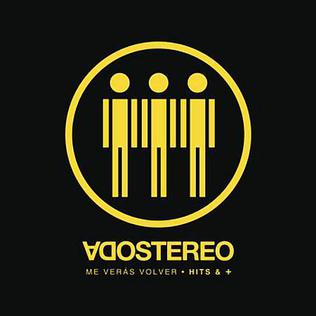
Me Verás Volver is a compilation album released in July, 2007 by Argentine rock band Soda Stereo. The album shares the name with their comeback tour that started on October 19 of the same year, which in turn is taken from a line in their song 'En La Ciudad De La Furia'.
"De Música Ligera" is a song by the Argentine rock band Soda Stereo from their fifth studio album Canción Animal (1990). Widely considered to be Soda Stereo's most popular single, the song is considered an anthem of rock en español. The single was the last song performed at their farewell concert "El Último Concierto" in 1997.
Séptimo Día - No Descansaré was a touring arena show by Cirque du Soleil, inspired by the music of Argentinian band Soda Stereo.

Andrea Álvarez is an Argentine musician. She was part of Rouge, the first all female Argentine rock band, and accompanied many nationally and internationally renowned artists.

















